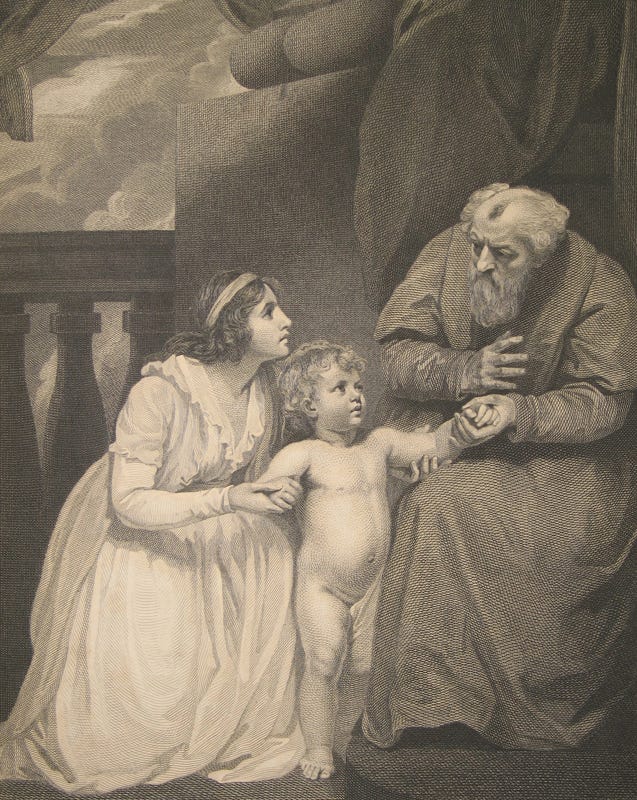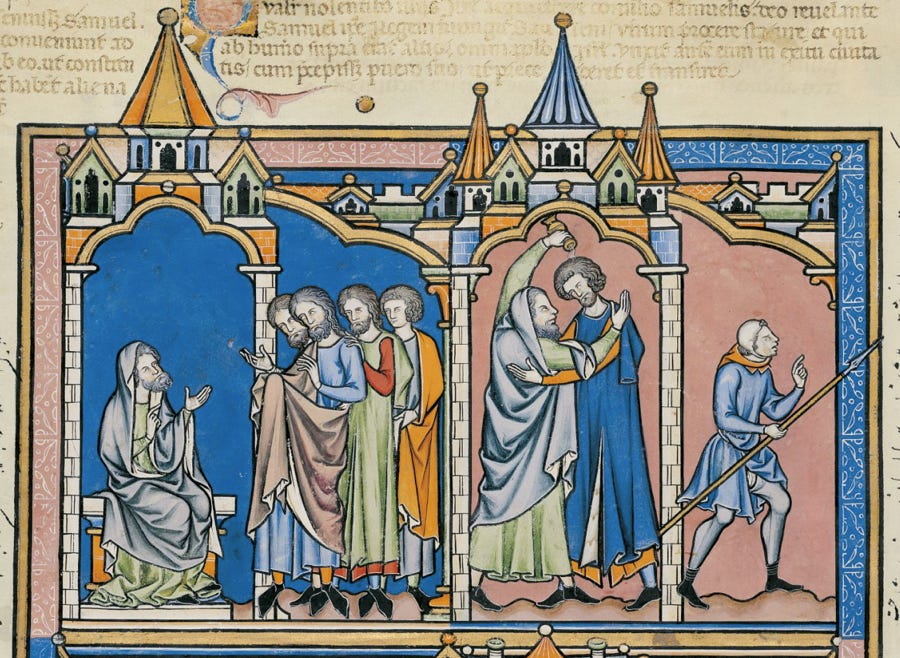Robert Alter, scholar and translator of the Hebrew Bible, calls the Book of Samuel “one of the most astounding pieces of narrative that has come down to us from the ancient world.” But he would say that—he’s got bibles to sell.
Luckily, I can confirm.
So far we’ve talked about a high priest named Eli, an endless war, and a plague of hemorrhoids. Astounding, yes. But you may be wondering, where is David? Where’s his lady on the roof? Will we be getting to the incest?
With today’s story, we take an important step towards the incest. It’s time to put Samuel front and center, and it’s time to tell how Israel became a monarchy.
• • •
Samuel started out as a lackey. His mother donated him to the temple when he was just a toddler and he spent his childhood in Shiloh, cleaning up after priests. Samuel carried wood and scrubbed the blood out of garments. He was at Eli’s beck and call, even slept nearby to serve his merest need. He was a lackey, and if things had gone differently, he might have kept lackeying his whole life.
Biblefreaks might remember what happened instead. One night, the boy heard a voice. “SAMUEL. I AM GOD. HI!”
The message continued: “SO I AM GOING TO KILL ELI, LOL. ALSO HIS SONS. THEY SUCK.”
“BUT I LIKE YOU! YOU AND I ARE GOING TO GET ALONG GREAT. XOXOXO BYE!”
“HAHA ALSO DO YOU WANT ME TO PLAGUE ANYBODY? I WOULD SO DO IT. I’M IN THAT KIND OF MOOD. JK, JK, OK WE’LL TALK SOON. HOPE I WASN’T TOO AWKWARD, LOL.”
And all this is exactly what happened. Eli’s terrible sons marched the ark into battle. The Philistines captured the ark and killed the kids. When news got back to Eli that his sons were dead, he shrugged. When they told him the ark had been captured, he toppled out of his chair and broke his neck.
Then Eli’s head snapped off his neck and rolled away. The head rolled into the temple courtyard. Priests scattered like mad and several ran to the altar and retched. Some jumped off towers in the terror and confusion. And the head kept rolling out the temple. At least that’s how it would’ve gone if I wrote it. Either way, Eli is now dead.
• • •
With the priests gone, Samuel became the nation’s de facto leader.
He whipped Israel into shape. He traveled from town to town, answering questions. He is a prophet—God’s BFF—and at times can see the future. The people thrive under this arrangement. The ark is regained. Israelites toss away their foreign idols. There is even peace, for a time.
Years later, however, Samuel is slowing down. He spends more time at home in Ramah. He scowls at visitors. He is tired of these in-bred bumpkins and their inability to follow the rules of their (admittedly) quirky deity. Samuel doesn’t want to tell fortunes or dispense advice for much longer.
A nation wonders: what comes next?
Samuel has sons. Their names are Joel and Abijah. He appointed them as judges in Beer-Sheba, just about as far away as he could. Almost immediately, they started taking bribes. Not even subtly. Just buy yourself whatever verdict you like. Fifty shekels to get off of manslaughter. Stonings are a hundred.
Samuel doesn’t worry about this stuff. Whoever ends up in charge, it won’t be Samuel the Prophet. It won’t be his crooked kids either. Too bad, as he understands that the people want stability. But these are not a stable people! All their heroes are insane. They are contentious and ungovernable. Imagine if they had a real army—the mind reels.
Which brings us to our scene. A group of men have just arrived in Ramah. They are leaders of the Israelite tribes. They have decided to find Samuel, to enter his home, and to beg him, pretty please, to find and anoint a king to rule over them.
Samuel, however, is not pleased.
The men represent all the tribes of Israel. Samuel stares at them. He is upset and terrifying.
“I must have misheard you,” he says. “Say it again.”
“We want a king,” the leader repeats.
“Do you know what I want?” Samuel rubs a sore on his leg and takes a sip from whatever brew is in his cup. “I want to be dead. No joke. I want to be buried in a quiet place. Then I won’t have to listen to stupid people say the dumbest things possible, over and over again.”
The elders of Israel huddle and whisper one to the other. They were sent here to get a king. They can’t leave without one.
“Great prophet,” says the same leader. “You are growing old and no longer wish to lead the people. This is obvious based on the scowling, hiding at home, et cetera. Who will lead us after you are gone? Your sons…”
“My sons aren’t fit for jack,” says Samuel. “They should be kept a healthy distance from anything of import. They’re no good. Is that my fault? If God had told me to spend time at home, I would have done that. Instead, He told me to deliver homilies to illiterate farmers in nowhere-towns. He asked me to be a leader. Leaders are not fathers. Which, by the way, is why you people shouldn’t have a king. Now—what were you asking for again?”
“Samuel,” says the leader. “We merely ask for what other nations all have. The Philistines. The Amorites. The Edomites. Each has dominated us for hundreds of years. A king could help.”
“Listen,” says Samuel, leaning on his stick and rising to his modest height. “What you’re asking for is a—”
Suddenly, Samuel’s head snaps up. No, not like Eli’s. More like he had just been hooked by a rod, the fisherman now tugging at the line.
“Are his eyes supposed to do that,” asks a tribal leader.
“Is that a nosebleed,” asks another.
“HEY BUDDY!” came a voice thundering like an angry ringtone in Samuel’s ears. “LISTEN, I AM TOTALLY WITH YOU ON THE KING BUSINESS, SUCH A BAD IDEA!! CAN YOU BELIEVE IT??? ON THE OTHER HAND, LET THEM DO IT? IT’LL BE FUNNY!!!! BUT FIRST TELL THEM HOW IT’LL BE. NOT LIKE THEY’LL LISTEN, LOL!”
Samuel’s head snaps back. He wipes his nose and points his stick at the gathered men. “Listen geniuses,” he says. “If you get your king, let me tell you exactly what he’s going to do.”
“This king is going to take your sons and shove them into chariots. He’ll take your boy, not even grown, and send him to the front with a sword in his hand. Disposable young men are the key to military might. You want what the Emorites have? I promise that if you have a king, you’ll get it.”
“Don’t think, by the way, that your daughters will get off better. Kings have servants. They have feasts. They need perfumers, cooks, bakers, dancers, and all sorts of other things that I don’t feel like mentioning because they are traumatically sexual and uncomfortable to speak of.”
“All praise this king! He’ll tax the bejesus out of you. He’s coming for your lands and crops. Your flocks. He’ll give them to his courtiers and eunuchs—you forgot about eunuchs? He’ll take your favorite slaves and make them his own. You are asking for a man to be granted ultimate authority. These people don’t like any authority. Are you sure what you want is monarchy? Maybe this nation should try to successfully organize a bake sale first. A king—I can’t believe this!”
Samuel takes a deep breath. He sits back down. The men are silent. Eventually, one of them speaks.
“Nevertheless,” the leader says. “We want a king.”
Samuel closes his eyes. His head snaps back, just as before. The men can’t hear what is happening to Samuel, because it is happening in his mind. All they can see is Samuel, shaking his head back and forth. At one point he shouts (“No!”) and tears flow down his cheeks. He begins to shake, and then, at last, his eyes open. He grabs his stick and sighs.
“Well,” he says to the men, while rising from his seat. “It seems I am off to find your king.”
Samuel’s on the road again. But before he goes, he moves up to the leaders of Israel. He works up a giant loogie, spits it directly at their feet, and walks away, cursing the people of Israel for ruining a perfectly good time.







"...I won't have to listen to stupid people say the dumbest things possible, over and over again..."
That's exactly what the modern Internet is, and he seemed to know it. No wonder they called him "The Prophet".
Even though I know what's going to happen, I can't wait to read what's going to happen!